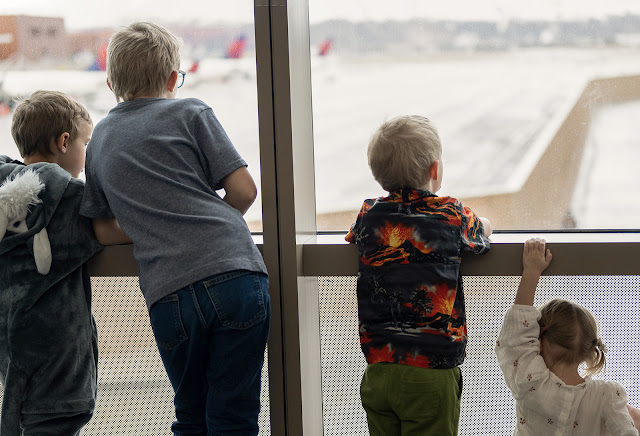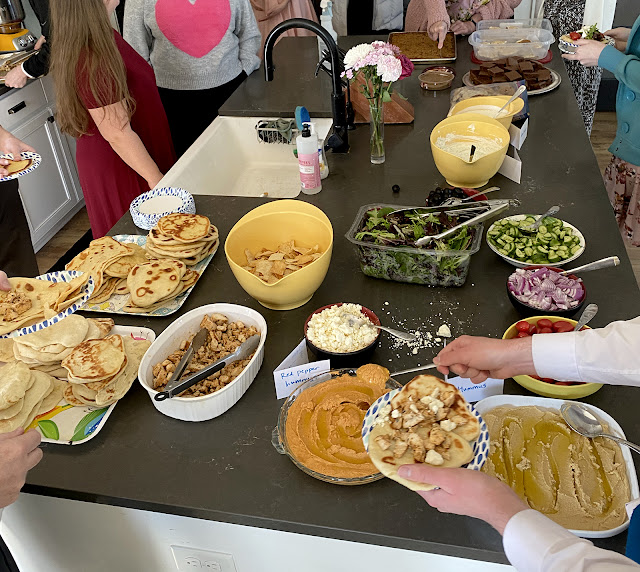He's home, he's home! He came home on Sam's birthday. We were all excited, of course, but I was apprehensive too—not sure how Abe would be feeling, not sure what the mood would be. I know returned missionaries sometimes have trouble finding their place after their missions, and I know they have mixed emotions upon leaving the friends and purpose they've gained in the past two years. I was afraid he'd be too sad to be happy to see us! So, knowing all this, I wondered if I would feel mixed emotions too? But it turned out, when the time came, I didn't! It didn't matter if Abe was filled with pure joy or not (though of course I hope he was!)—my joy was deeper and bigger than almost anything I've felt before! It surprised me a little! But I was so happy to see him, so happy to hug him, so happy to finally feel the hole—a hole I didn't even realize was still inside me!—filled back up by having our whole family together again!
I know we don't really have him back again, not for good. Several people have pointed that out to me this week—that this is really just the beginning of the separation where children go away and don't ever come back as children again. It's the way things are supposed to be and I'm (theoretically) okay with it. Of course I want Abe to grow more independent, to start his own family, to build his own life! He and Seb already have imminent plans. But come on, can't I just enjoy this time for a minute? All of us under one roof, the dinner table full, barely enough seats in the car? It is joyful even when it's chaotic and exhausting—joyful because now I'm starting to know what it means.
Sebastian took most of the airport photos. I was so grateful because I knew I wouldn't have any attention to spare for pictures, but I wanted pictures!
(Seb just got a job at the airport, so even amid the excitement of Abe's arrival, everyone had extra interest in seeing how the taxiways were laid out and how the baggage carts work, etc. The little boys have never seen airplanes up close before and were delighted with how BIG they are!)
Ky wasn't able to come to airport with us, blast him, but was happy to greet Abe (with panda bears) when we got back home!
Almost everyone!
Clementine was seven months old when Abe left on his mission, so I thought she'd be more shy around him, but I guess talking to him on the phone has helped her get over that. She was happy to sit on his lap and ask him questions and explain seriously to anyone who would listen, "Abey HERE now."
A full dinner table!
Abe gave a wonderful homecoming talk in sacrament meeting, full of power and spirit, and I listened to him in amazement. (The Zoom link to the meeting didn't work for my out-of-state brothers, unfortunately, but my oldest brother Kenneth wrote to me, "We were sad not to be able to hear Abe’s homecoming talk, but the talk we imagined him giving was one of the greatest talks ever delivered anywhere, missionary homecoming or otherwise, and is still warming our hearts and lifting our spirits as we think back on it today." Ha!)

Abe wanted Greek food for lunch with family and friends afterward, and once you eat homemade pita you can't go back, so we spent two hours before church just cranking out pita and cooking it on griddles and in the pizza oven. We had piles of it! About 140 pita, I think (though to be precise, a few dozen were actually naan). It nearly all got eaten, which did my heart good (I do love to feed people good food).
Daisy's pita factory
The house was so happy and loud filled with all the people who love Abe!
Pita, chicken, feta, hummus, red pepper hummus, tomatoes, olives, onions, cucumbers, feta sauce, tzatziki. Such a good spread!
Elder Bruce Hafen said that the whole purpose of the plan of happiness is "so we can return home and know what it means to be there." I'm not sure this homecoming is
fully like that, for Abe—though I bet he knows more of what home means than he used to! But for
me, his homecoming does have a little of that flavor—the glimpse of eternity behind the present. The purpose beneath sorrow. The deep joy beneath the mundane. It makes me look to future homecomings, earthly and heavenly, and anticipate experiencing them, too, in the context of "
what a fulness means."

















































